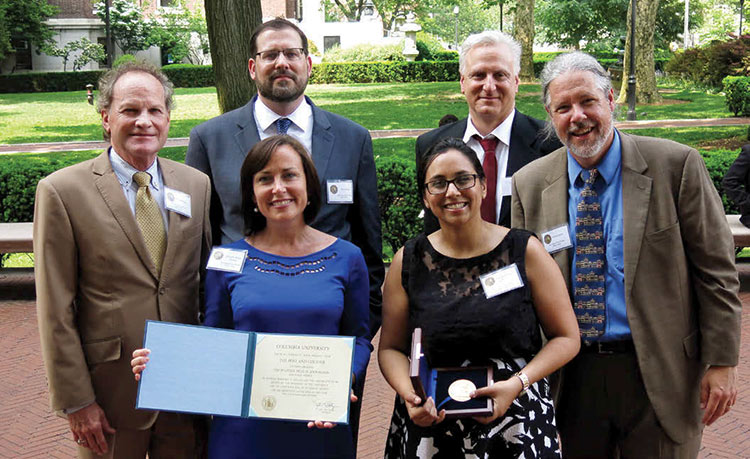
Editor’s note: The Post and Courier, the Charleston area’s daily newspaper, won its first Pulitzer Prize since 1925 this year. East Cooper residents Natalie Caula Hauff and Jennifer Berry Hawes were among the four reporters who contributed to the series that earned the coveted award for the newspaper. Hauff describes what it was like.
We were all still in awe as we stood outside the steps of Columbia University’s Low Library in New York City, where we had just been awarded the greatest honor in journalism, the Pulitzer Prize in Public Service.
As we prepared to leave, a greater accomplishment was realized, one none of us were quite sure would ever really happen.
“The state passed the legislation. It’s done,” yelled Doug Pardue, one of four reporters who wrote “Till Death Do Us Part” for The Post and Courier, a series about domestic violence in South Carolina.
I exchanged hugs and high fives with my teammates Pardue, Projects Editor Glenn Smith and Reporter Jennifer Berry Hawes. Ten months of hard work had paid off.
“It was gratifying and I was happy to see that our work had done something meaningful to help victims and help stem this horrible crime,” Pardue said.
After we published our series of articles and national attention was directed to the Palmetto State’s deadly record of women killed by men, the state Legislature started working on passing its first piece of significant legislation aimed at curbing the statistic that kept us on the list of deadliest states.
 The Pulitzer board called the articles “a riveting series that probed why South Carolina is among the deadliest states in the union for women and put the issue of what to do about it on the state’s agenda.”
The Pulitzer board called the articles “a riveting series that probed why South Carolina is among the deadliest states in the union for women and put the issue of what to do about it on the state’s agenda.”
The legislation passed the day we were awarded our Pulitzer Prize, on May 28, 2015.
“It was such an honor and so humbling to have won this award and be placed in such esteemed company,” Smith said. “It was even more gratifying to have won the award on the same day the reform bill passed in the Legislature.”
How It All Started
In September 2013, the Violence Policy Center released its annual report of states with the highest rate of women killed by men. South Carolina was at the top of the list, with a rate more than double the national average.
Smith, a veteran crime reporter for The Post and Courier, wrote an article about the ranking, as the newspaper had done in years prior, but this one got him thinking. He discussed the situation with some of the editors as well as with Pardue, who worked on special projects.
“As we talked more about it, we came to realize South Carolina had topped this awful list three times in the past decade and had been among the deadliest states for women for 15 years,” Smith said. “We decided it was imperative that we take a deeper look and figure out what was driving this violence in our state.”
It was the beginning of a project that would grow much larger than any of us imagined. Glenn asked me to join the team. I had been covering the crime and court beat for the newspaper for a little more than a year, so I had some experience working with data research and analysis. Jennifer Berry Hawes, a features reporter with a knack for narrative story-telling and highlighting the humanity behind the numbers, also joined the team.
We started with some basic information from several annual reports published by the South Carolina Attorney General’s Office – the names and ages of women killed by men in the last 10 years, including a brief synopsis of how they died.
With the assistance of the Center for Investigative Reporting, which provided training for the data analysis, editorial support and funding for graphics, we expanded the database so we could identify patterns and, we hoped, figure out solutions.

We researched every case and picked them apart: the time of day the women were killed; whether the perpetrators had prior criminal domestic violence charges or convictions; the weapons they used. After several months, we started cominterviewing women who were survivors of domestic violence and family members who had lost loved ones, and their stories were intertwined with the brutal statistics we’d collected. The articles began like this:
More than 300 women were shot, stabbed, strangled, beaten, bludgeoned or burned to death over the past decade by men in South Carolina, dying at a rate of one every 12 days, while the state does little to stem the carnage from domestic abuse.”
Recognition
The articles were published online in August 2014 and ran as a series for five days in print, and the topic of domestic violence in South Carolina was suddenly thrust into the spotlight both locally and nationally.
April 20 was the day we had been anxiously awaiting. In the newsroom, everyone gathered around the big screen televisions and watched the announcement.
“I felt nervous but mostly it just seemed surreal,” Hawes said. “I saw the publisher, owner, board chairman and all the editors file into the newsroom and thought this was either going to be an amazing moment of my life – or one of the most embarrassing.”
“The Gold Medal for Public Service goes to The Post and Courier.” The words resonated through the newsroom as cheers erupted and people embraced each other, some in tears. Later, as we celebrated, it was difficult not to cry. It’s a dream come true for all of us.
“I was ecstatic and so happy my wife Judy was there to share the moment with me, hug me and keep me from collapsing in a puddle,” Pardue said. “It was a lifetime achievement.”
By Natalie Caula Hauff

Leave a Reply